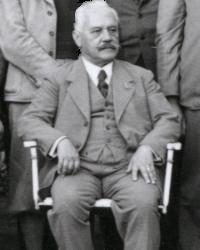Arnold Sommerfeld
Arnold Johannes Wilhelm Sommerfeld (December 5, 1868 in Königsberg, East Prussia – April 26, 1951 in Munich) was a German mathematician and theoretical physicist.

Education change
Sommerfeld was the son of a practical physician. After finishing school in 1886, he started studying mathematics at the University of Königsberg. In 1891 he wrote his doctorate thesis about arbitrary functions in mathematical physics. Afterwards he had to serve in the army.
Then he went to Göttingen. He became assistant at the institute for mineralogy, but was still interested in mathematical physics.
Works change
In 1894 he became the assistant of Felix Klein. The year after he wrote his habilitation about the mathematical theory of optical diffraction and became docent for mathematics in Göttingen.
In 1897 Sommerfeld married. In the same year he became ordinary professor for mathematics at the mining college of Clausthal. Three years later he got a professorship at the Technical University of Aachen.
In 1906 he became professor for theoretical physics in Munich, were he stood for his lifetime. While he was professor in Munich, he travelled twice around the world - in 1922/23 he was guest professor in Wisconsin and travelled afterwards through India, China and Japan, in 1928/29 he made a journey through the US as a university teacher.
He started taking out a pension in 1935, but he still worked until 1940. There was a lot of trouble choosing the person who should follow him. Sommerfeld wanted to have Werner Heisenberg to follow him, but in the time of the Nazi regime the job could only go to a person who taught the so-called German Physics, which included a kind of mysticism. Sommerfeld tried to prevent that.
Sommerfeld died in 1951 in a traffic accident.
Works change
- Theorie des Kreisels. 4 volumes (with Felix Klein), Leipzig 1897-1910
- Atombau und Spektrallinien. Braunschweig 1919
- Vorlesungen über theoretische Physik
- Vol. 1: Mechanik. Leipzig 1943
- Vol. 2: Mechanik der deformierbaren Medien. Leipzig 1945
- Vol. 3: Elektrodynamik. Wiesbaden 1948
- Vol. 4: Optik. Wiesbaden 1950
- Vol. 5: Thermodynamik und Statistik. Wiesbaden 1952
- Vol. 6: Partielle Differentialgleichungen der Physik. Leipzig 1945